Key takeaways:
- Effective communication frameworks reduce misunderstandings and enhance team productivity by creating a common understanding of roles and messages.
- Clear communication is essential to build trust and ensure that messages are understood, preventing chaos in personal and professional interactions.
- Miscommunication is often caused by assumptions, language barriers, and emotional contexts, emphasizing the need for active listening and clarifying questions.
- Personal experiences highlight the importance of context and intention in communication, showing that patience and adaptability can significantly improve understanding.
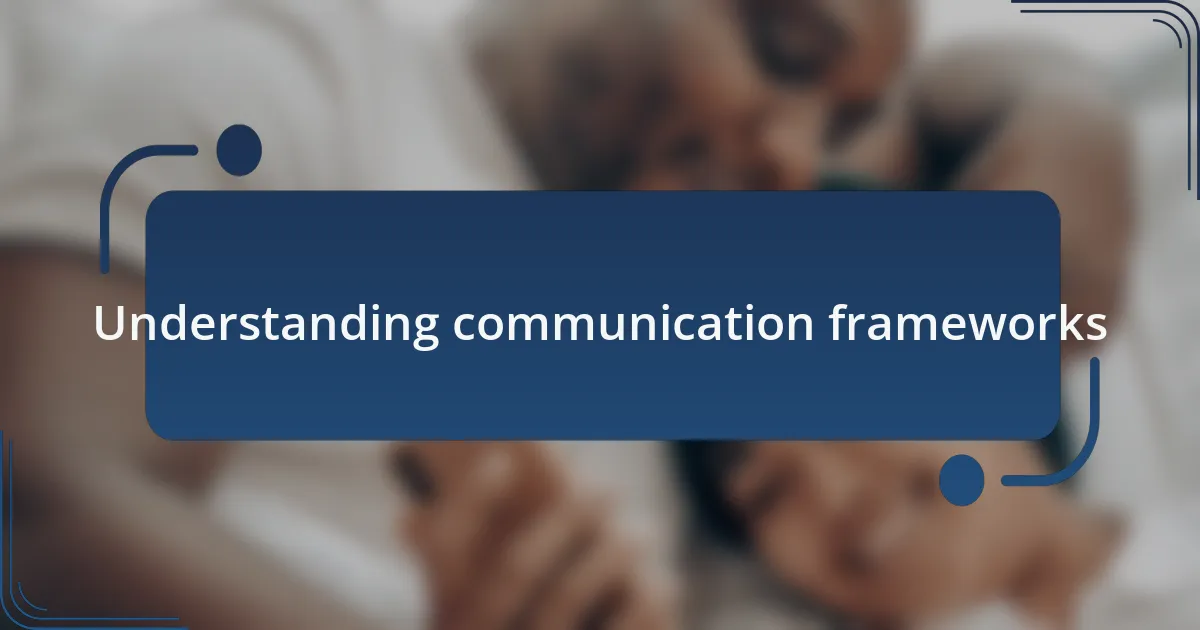
Understanding communication frameworks
Communication frameworks are structured approaches that help us understand how information is exchanged. I’ve noticed that when these frameworks are applied effectively, like in my own experiences during team meetings, misunderstandings can be reduced significantly. Have you ever had a conversation that felt like you were speaking different languages? That’s where these frameworks come in handy—they create a common ground for expressing ideas clearly.
I remember a project where my team struggled to align our thoughts, leading to frustration and confusion. We eventually implemented a communication framework that defined our roles and clarified our messaging. The shift was remarkable; once we had a shared understanding, it not only boosted our productivity but also strengthened our relationships. Isn’t it fascinating how much smoother interactions can be when everyone is on the same page?
Understanding communication frameworks also involves recognizing the nuances of different contexts and audiences. I’ve learned that what works in one setting may not apply in another. For instance, when addressing a diverse group, adapting our communication style can make all the difference. How have you approached adapting your communication to suit various situations? This adaptability is key to ensuring our messages are not only heard but truly understood by others.
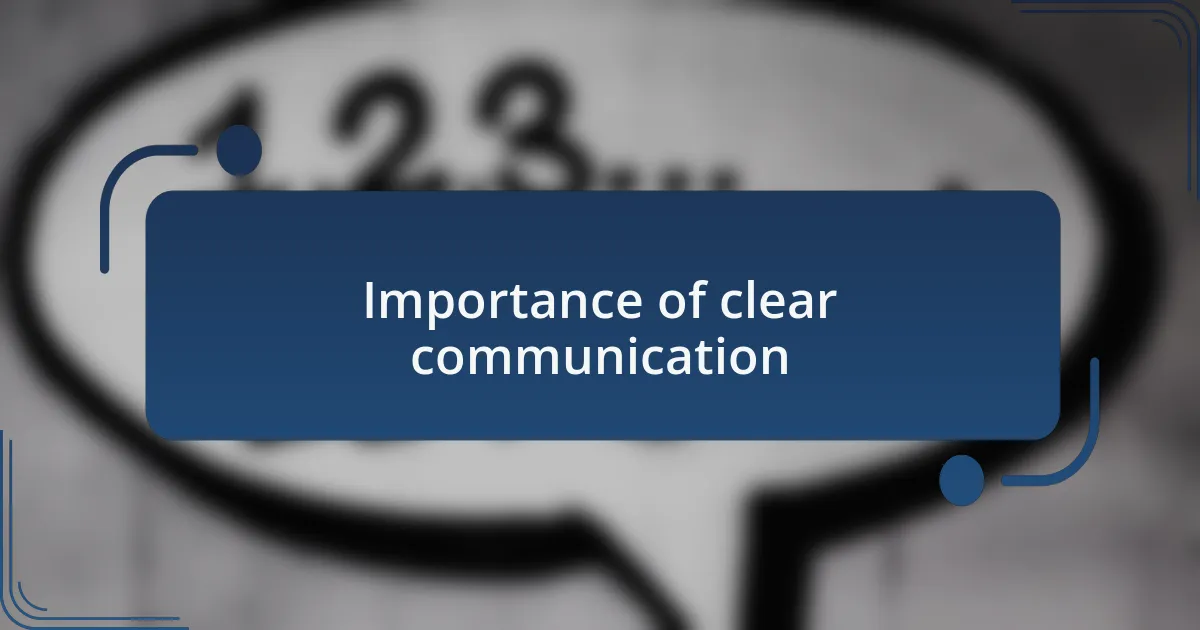
Importance of clear communication
Clear communication is the backbone of effective interactions, both personally and professionally. I recall a time when I overlooked this crucial aspect during a crucial presentation. I assumed everyone understood my technical jargon, but many were left puzzled. That experience taught me that clarity is not just about what you say; it’s about ensuring your audience truly grasps the message you’re delivering.
Have you ever found yourself in a situation where miscommunication led to unexpected consequences? I certainly have. Early in my career, I neglected to confirm a project’s details with my team, which resulted in duplicated efforts and wasted time. This taught me that when communication lacks clarity, it can create unnecessary chaos, underscoring the need for precise and straightforward exchanges.
Additionally, clear communication builds trust. I remember collaborating with a colleague who often paraphrased my ideas to ensure he fully understood them before moving forward. This not only fostered a sense of partnership but also empowered me to be as transparent as possible. Isn’t it interesting how that simple act of confirming understanding can transform a working relationship?
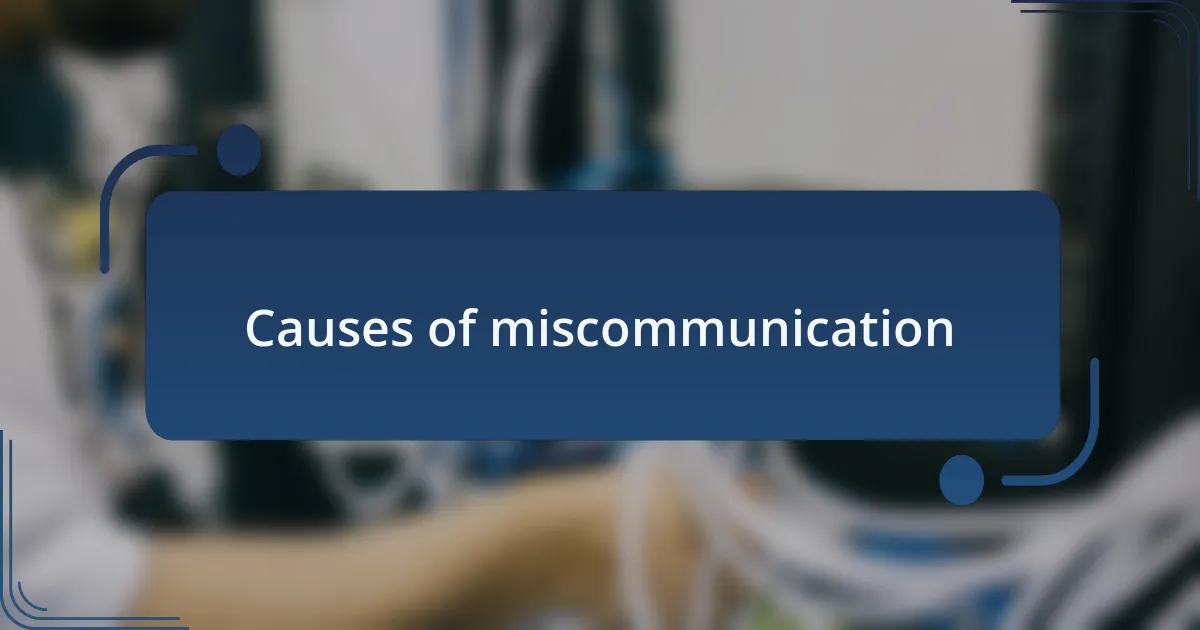
Causes of miscommunication
Miscommunication often stems from assumptions. I once worked with a team on a marketing campaign where we all thought everyone was on the same page. However, it turned out that different team members had various interpretations of our objectives. This assumption cost us valuable time and taught me the importance of asking clarifying questions—something I now make a priority in every project.
Another major cause is language barriers, even among native speakers. I remember sitting in a meeting where industry jargon flew around like confetti. While some members enthusiastically nodded, many stared blankly at their notes. This experience highlighted how easily language can alienate individuals, reminding me that simplifying our vocabulary can help ensure every voice is heard.
Emotional context also plays a significant role in how messages are received. During a delicate conversation with a friend, my aim was to convey support, but my tone unintentionally came off as dismissive. Reflecting on that situation taught me that awareness of not only what I say but also how I say it is crucial. How often do we let our emotions cloud the clarity of our message? I’ve learned to pause and consider my delivery to maintain trust and understanding.
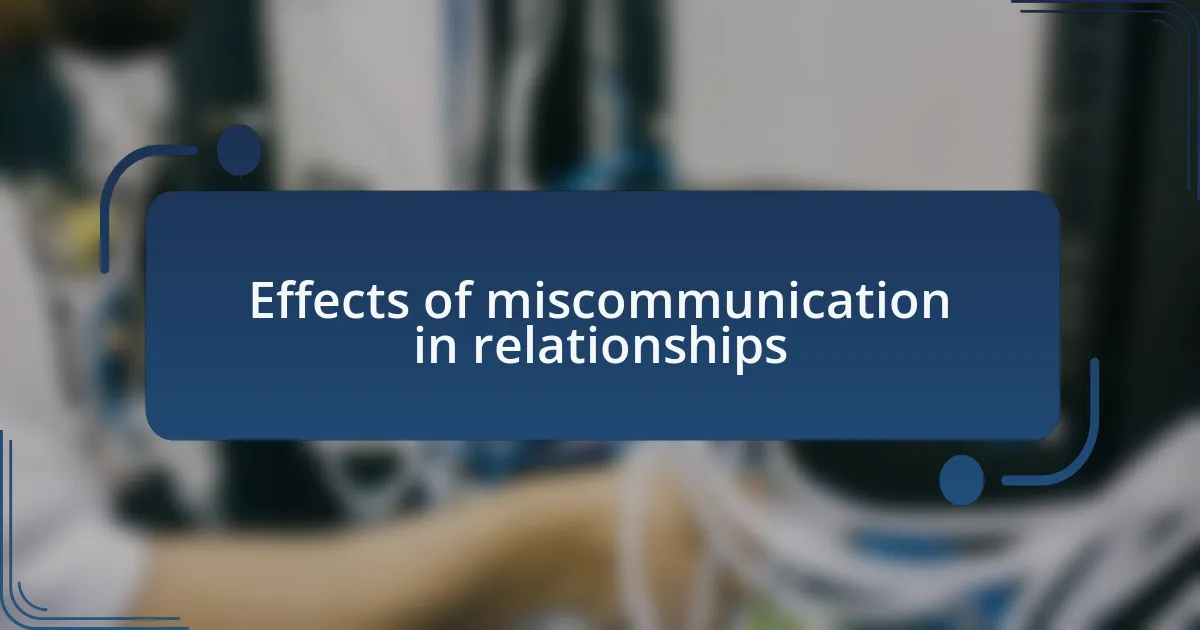
Effects of miscommunication in relationships
Miscommunication in relationships can create significant emotional distance. For example, I once had an argument with a close friend over a misunderstanding about a social plan. I assumed she wanted to get together based on a casual comment, but for her, it was just a passing thought. The fallout was disappointing; we both felt hurt and neglected, which made me realize how critical it is to clarify intentions.
Moreover, the cumulative effects of miscommunication can lead to resentment. I’ve experienced a gradual buildup of frustration in a romantic relationship simply because we weren’t voicing our concerns. After weeks of silence over little misunderstandings, I found myself resenting my partner for not “getting me.” Isn’t it interesting how the smallest missteps can snowball into larger issues if left unaddressed?
Ultimately, miscommunication can distort our perceptions of each other. I recall an incident with a family member where a simple joke was taken the wrong way and led to a prolonged silence between us. In reflecting on that time, I’ve learned that it’s essential to revisit and clarify our messages, especially when emotions are at play. Can you relate to the aftermath of miscommunication? I certainly can, and it’s a reminder that our words hold power in shaping our relationships.
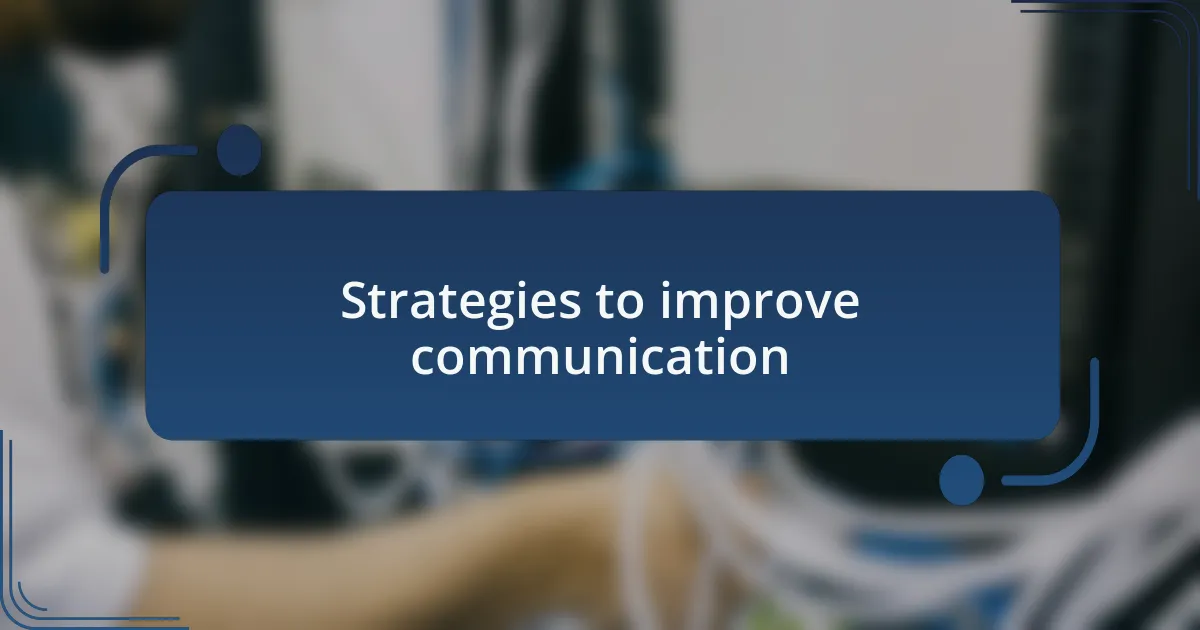
Strategies to improve communication
One effective strategy to improve communication is to practice active listening. I remember a time during a team project when I was so focused on presenting my ideas that I missed key points my colleagues were making. By merely nodding along, I eventually realized that I had misunderstood their perspectives, which led to inefficiencies. Have you ever noticed how truly listening to someone can change the entire dynamic of a conversation?
Another vital approach involves asking clarifying questions. I learned this lesson the hard way during a family discussion about holiday plans. I thought everyone was on the same page, but when I didn’t verify details, chaos erupted. Stepping back to ask, “Can you clarify what you meant by that?” might seem simple, but it can cut through confusion and foster mutual understanding.
In addition, setting the right tone and context for conversations is crucial. I recall having a serious discussion over dinner that ended in frustration simply because the environment was too relaxed for such an important topic. By being mindful of the setting and choosing appropriate moments to communicate openly, we can significantly enhance the clarity of our messages. What about you? Have you ever felt that the right setting has transformed how you connected with someone?
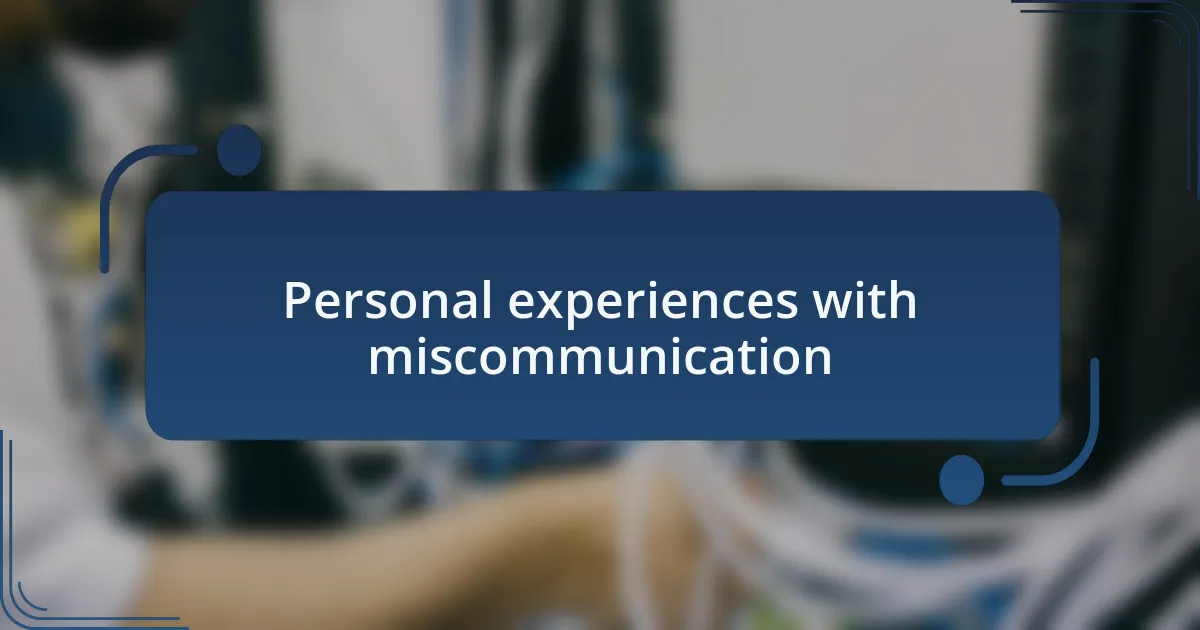
Personal experiences with miscommunication
In my own experience, miscommunication often emerged at the most unexpected moments. There was this time when I sent a quick text to a friend, only to find out later that my message had a completely different tone than I intended. I had meant to convey excitement about a concert, but the way I phrased it made my friend feel overlooked. How could just a few words spark such a misunderstanding? It was a stark reminder of how easily messages can be misinterpreted in our fast-paced digital world.
I also remember a pivotal meeting at work where my attempt to explain a new project went awry. My enthusiasm overshadowed my explanation, and several team members walked away confused about their responsibilities. Reflecting on that experience, I realized that sometimes, slowing down and crafting our words with care is essential. Has there been a situation for you where your excitement got in the way of clarity?
Then there was the family gathering where everyone was tossing ideas back and forth, yet somehow, the conversation went in circles. I shared my thoughts, believing I was contributing to a joint decision for a family vacation. Instead, I learned later that others had interpreted my comments as firm preferences. Looking back, I now understand the importance of being explicit about my intentions. Don’t you think it’s fascinating how clarity or lack thereof can shape the direction of our interactions?
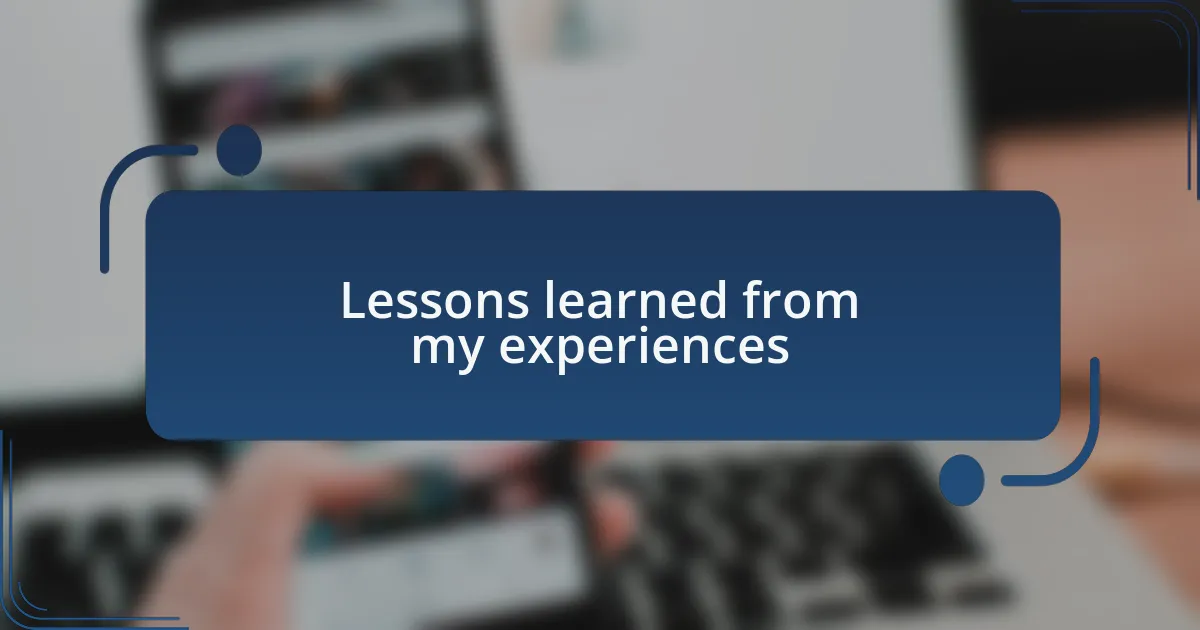
Lessons learned from my experiences
Misunderstandings have taught me the value of patience in communication. I recall a time trying to coordinate a group project. In my eagerness to get things rolling, I shot off an email with a vague deadline. It wasn’t until a team member asked for clarification that I realized my rushed message left everyone scrambling. This taught me that taking time to be clear can save a lot of confusion later on.
Another lesson sprang from a casual dinner where I tried to share an inside joke. When I noticed blank stares instead of laughter, I felt a wave of embarrassment wash over me. It highlighted the importance of context; what makes sense in one group might fall flat in another. Do you think sharing your humor should always consider your audience’s backgrounds? I learned that tailoring my message to my listeners can transform a simple joke into a memorable moment.
Lastly, during a recent collaborative event, I misread someone else’s suggestions as critiques. My initial reaction was defensive, but as I reflected on their feedback, I saw how it could enhance our project. This shifted my perspective on constructive criticism. Have you ever felt defensive about feedback only to realize its potential value later? I’ve come to appreciate that miscommunication can serve as a bridge toward better understanding, but it requires a willingness to listen and adapt.